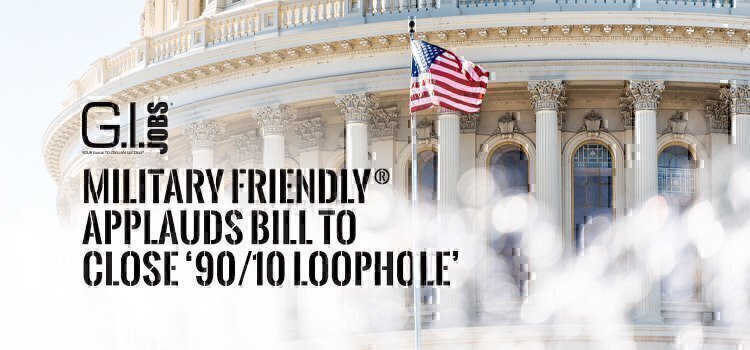Federal legislation that would limit the revenue for-profit schools can draw from military and veteran students may have a better chance of success this time with the backing of Sen. Lamar Alexander (R-Tenn.), who chairs the U.S. Senate’s education committee.
Alexander has opposed previous attempts to close a loophole in federal regulations that allows for-profit schools to count GI Bill funds and Tuition Assistance funds as private revenue rather than federal student aid. Under the Higher Education Act, proprietary schools cannot receive more than 90 percent of their revenue from federal student aid. The so-called 90/10 loophole, critics say, puts a target on the backs of military and veteran students.
“Unfortunately, for too long, bad-actors in the for-profit sector have exploited a loophole in the system—known as the 90/10 loophole—and taken advantage of our veterans and their generous education benefits,” said Sen. Tom Carper (D-Del.), who introduced the Protect VETS Act along with Senators Jon Tester (D-Mont.), James Lankford (R-Okla.) and Bill Cassidy (R.-La.).
“To be clear, not all for-profit schools are bad actors. In fact, many are doing a good job. However, I believe that one veteran misled or mistreated by a for-profit school is one veteran too many. In response, I believe it’s long past time for Congress to heed the advice of our nation’s Veterans Service Organizations and close the 90/10 loophole.” – Sen. Tom Carper (D-Del.)
Introduced just days after Veterans Day, the bill represents the first bipartisan effort to close the 90/10 loophole. The support of Alexander could make a difference in becoming law.
“I appreciate the work Senators Carper, Cassidy, Lankford and Tester have done to take a highly partisan issue and create a bipartisan solution,” Alexander said in a written statement. “This is a responsible and reasonable step to ensure that all of our military and veteran students are attending quality institutions worth their time and money.”
In an effort to encourage schools to follow the 90/10 rule while legislation is working through Congress, the ratings program Military Friendly®, which highlights employers and schools that are providing better outcomes for veterans, made the move earlier this year to close the loophole in its yearly Military Friendly® Schools Survey methodology. While Military Friendly® can’t close the loophole with legislation—which requires federal or station action—it has now made it a requirement that institutions applying for the Military Friendly® designation must be able to demonstrate that at least 10 percent of their funding is from non-government funded programs.
“Military Friendly® recognizes the importance of closing the 90/10 loophole and wanted to take action by doing our part to help drive responsible school behavior by officially recognizing it as a requirement in our annual Military Friendly® School survey,” said Joshua Rosen, operations manager. “We are very excited to see congressional leaders and veteran advocates move forward with a bipartisan effort to make the change in law, as well.”
Beginning with the 2020-2021 designation process, Military Friendly® will collect and analyze government data to determine whether a for-profit school earns more than 90% of its revenue from federal funding, to include GI Bill funds from the Department of Veterans Affairs and the Defense Department’s Tuition Assistance funds in addition to Title IV Department of Education funds. Schools that exceed the 90% cap will not be eligible for the Military Friendly® Schools designation.
The decision to close the loophole was made by the Military Friendly® Schools Advisory Council (MFSAC) after thorough consideration. The MFSAC consists of 17 school administrators and veteran students who advise the Military Friendly® Schools program.
“We are an organization of veterans whose sole purpose is to support veterans and their families. Closing the loophole is a decision based on both our mission and our goal to provide the best data and support possible,” said MFSAC member James Dubinsky, associate professor of rhetoric and writing at Virginia Tech and chairman of the VT Veterans Caucus.
MFSAC member Paul Esposito said closing the loophole is not an effort to single out proprietary schools, which are represented on the council. But the 90/10 rule in the Higher Education Act addresses only proprietary institutions.
“It does not matter to the council whether a school is for-profit or nonprofit. The goal is to ensure that our veterans receive a quality education while we remain vigilant stewards of our tax payer-based funds,” said Esposito, who serves as director of the Auburn University Veterans Resource Center at Auburn University in Alabama.
The MFSAC considered opinions from both sides of the issue, including input from Patrick Murray, deputy director for the Veterans of Foreign Wars (VFW).
“We think that schools that offer quality education and degrees should not have difficulty finding students to pay out of their own pockets.” – Patrick Murray, deputy director for the Veterans of Foreign Wars (VFW)
John Kamin, assistant director of Veterans Employment and Education for the American Legion, agrees.
“For nearly 10 years, the 90/10 loophole has been a regrettable footnote to the Post-9/11 GI Bill that allows proprietary institutions to leverage veteran recruitment to maximize federal student aid. The lack of transparency on schools taking advantage of the loophole has clearly hindered veterans’ ability to be informed consumers,” Kamin said. “Military Friendly®’s new methodology has effectively inoculated this unscrupulous tactic, and provides an excellent service to veterans charting their educational pathways.”
READ NEXT
10 Jobs That Pay $100K Without a College Degree
5 Differences Between Army and Marine Corps Infantry
The Real Life Story Behind Saving Private Ryan










